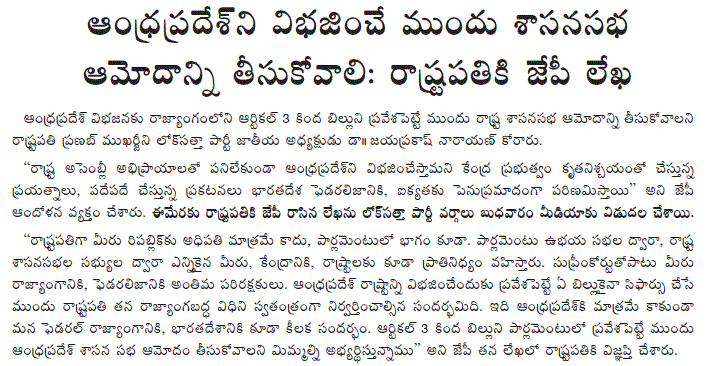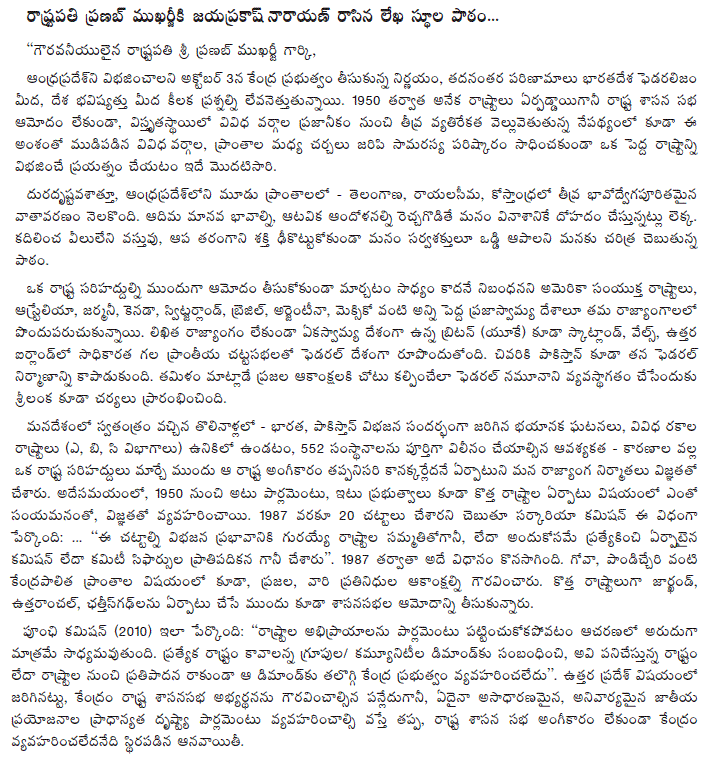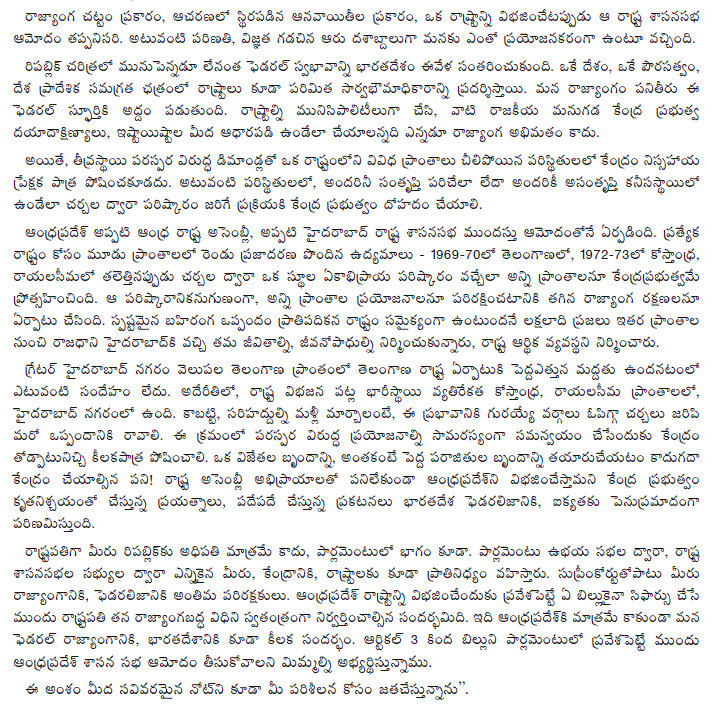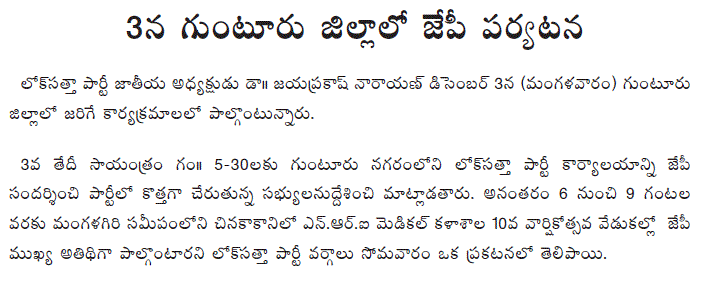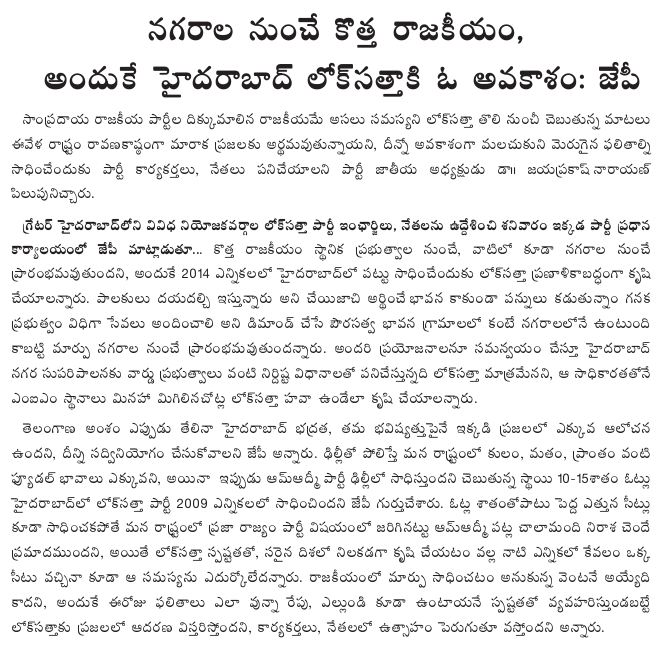Press Releases Archive
Obtain Legislature consent before dividing AP, Dr. JP tells Pranab
Lok Satta Party national President Dr. Jayaprakash Narayan has requested Mr. Pranab Mukherjee, President of India, to ensure that the State Legislature’s consent is obtained before a Bill is introduced under Article 3 of the Constitution in Parliament for the bifurcation of Andhra Pradesh.
“The determined efforts of the Union Government and its oft-repeated declarations that Andhra Pradesh will be divided irrespective of the State Legislature’s views pose a grave danger to federalism and unity of India”, Dr. JP told Mr. Pranab Mukherjee in a letter dated October 30, released today.
In his letter, Dr. JP said, “As the President, you are not only the head of the Republic, but also a part of Parliament. Elected by members of both Houses of Parliament as well as members of State Legislative Assemblies, you represent both our Union and the States, and you are the final defender of the Constitution and federalism along with the Supreme Court. This is, therefore/ a fit case where the President should exercise his constitutional duty independently before recommending introduction of any Bill to divide the State of Andhra Pradesh. This is a defining moment not for Andhra Pradesh alone, but for our federal Constitution and India itself.”
Dr. JP recalled that Andhra Pradesh was formed with the prior consent of the then Andhra State Legislature, and the then Hyderabad State Legislature. When two popular movements for a separate State were launched in the three regions – in Telangana in 1969-70, and in Coastal Andhra and Rayalaseema in 1972-73 – it was the Union Government which encouraged all regions to arrive at a negotiated settlement, and put corresponding constitutional safeguards in place to protect the interests of all regions. “On the basis of an explicit compact that the State would remain united, millions of people migrated to other regions and to the capital city of Hyderabad, and built their lives, livelihoods and the State’s economy.”
“Undoubtedly there is large support for the formation of Telangana State in the Telangana region outside the Greater Hyderabad city. Equally certainly, there is overwhelming opposition to division of the State in Coastal Andhra and Rayalaseema regions, and in Hyderabad city. Therefore, any redrawing of the boundaries would need another agreement arrived at by the affected parties through patient negotiation, and the Union has a seminal role in helping reconcile conflicting interests harmoniously. It cannot create a group of winners, and a much larger group of losers. ”
Dr.JP pointed out that “Several States have been formed after 1950, but this is the first occasion when a major State is sought to be divided without the consent of the State Legislature, and without a negotiated settlement among the stake-holders and various regions, and in the face of fierce opposition from vast sections of the public.”
“Unfortunately, there is a surcharged atmosphere prevailing in all the three regions of Andhra Pradesh – Telangana, Rayalaseema and Coastal Andhra. When primordial loyalties and atavistic fears are aroused, we have a disaster in the making. History teaches us that we should at all costs avoid a confrontation between an immovable object and an irresistible force.
“Globally, major democracies including the United States, Australia, Germany, Canada, Switzerland, Brazil, Argentina and Mexico have incorporated in their Constitutions the provision that a State cannot be territorially altered without its prior consent. Despite being a unitary country without a written Constitution the UK is becoming a federal country, with empowered regional legislatures in Scotland, Wales and Northern Ireland. Even Pakistan has preserved its federal structure, while Sri Lanka is now attempting to institutionalize a federal model to accommodate the aspirations of Tamil-speaking people.
“In view of the circumstances prevailing in the country in the early years of freedom – the horrific events of Partition, existence of various types of States (Parts A, B & C), and the need to fully integrate the 552 princely States, the Constitution-makers wisely chose not to make a State’s consent mandatory before changing its boundaries. However, since 1950 Parliament and Governments have acted with restraint and wisdom in dealing with the formation of new States. Noting that 20 Acts have been enacted up to 1987, the Sarkaria Commission noted: … ‘It is noteworthy that these legislations were passed either with the consent of the States affected, or on the recommendations of a commission or committee set up for the purpose.’ After 1987, the same practice continued. Even in case of Union Territories like Goa and Pondicherry, the wishes of the people and their representatives were respected. The consent of legislatures was obtained while creating the new States of Jharkhand, Uttaranchal and Chattisgarh.
“The Punchi Commission (2010) observed: ‘In practice it is rarely possible for Parliament to ignore the views of the States. The Central government, in effect, cannot concede the demands of regional groups/communities for a separate State unless such a proposal is received from the State(s) in which these groups are currently located.’ As the UP case demonstrates, the Union need not honor the request of a State Legislature, but the settled principle and practice is that the Union will act only with the consent of the State Legislature.
“Constitutional law and practice have evolved over time, and willing consent of the State Legislature is deemed necessary before a State is divided, unless overwhelming national interest in extreme and compelling circumstances demands action by Parliament. Such maturity and wisdom served us well over the past six decades.
“India is more federal in nature today than ever before in our history as a Republic. Within the overarching framework of one nation, one citizenship, and territorial integrity of the nation, States too exercise limited sovereignty, and federal spirit informs the operation of our Constitution. The Constitution never intended to make India a unitary country with States functioning as municipalities, with their very survival as political entities dependent on the will and whim of the Union Government.
“However the Union cannot, and should not, be a helpless bystander when there is highly polarized situation between different regions in a State. In such a climate, there has to be a negotiated settlement satisfying all, or at any rate minimizing dissatisfaction to all and the Union should facilitate such a process.”
Dr.JP Visiting Guntur on Dec 3rd
Lok Satta Party national President Dr. Jayaprakash Narayan will be taking part as chief guest in the 10th anniversary celebrations of NRI medical college at 6.00 p.m. on Tuesday, December 3 at Chinakakani, near Guntur.
Earlier in the evening Dr.JP will be visiting the Lok Satta Party office at Guntur and interact with party leaders. He will also be inducting new members into the party.

